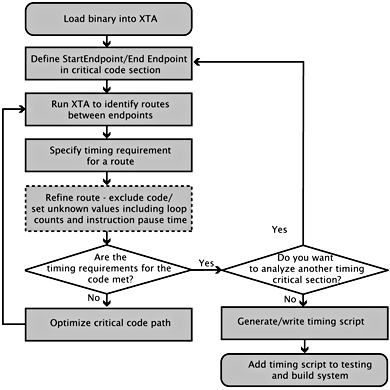Introduction
The XMOS Timing Analyzer (XTA) lets you determine the time taken to execute code on your target platform. Due to the deterministic nature of the XMOS architecture, the tools can measure the shortest and longest time required to execute a section of code. When combined with user-specified requirements, the tools can determine at compile-time whether all timing-critical sections of code are guaranteed to execute within their deadlines.
The typical flow for using XTA is shown in the figure below.
Typical XTA development flow

- Define the timing-critical code sections: It is possible to define the execution time of functions and paths between two points in a program as being timing-critical. For each of the routes identified, the timing requirements need to be specified.
- Create a timing script: Timing scripts are sequences of XTA console commands. In order to write portable scripts the source code needs to be annotated with XTA pragmas. The commands in the script can then refer to these pragmas. xTIMEcomposer Studio can automatically generate a script and annotate source code with XTA pragmas once the user has identified the timing-critical routes.
- Use the script: The timing script can be passed to the compiler or run in batch mode to verify that the program continues to meet its timing requirements each time it is compiled.